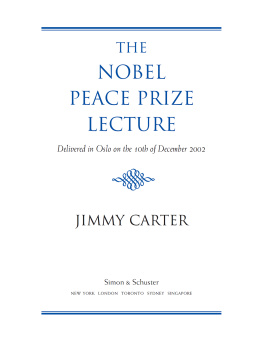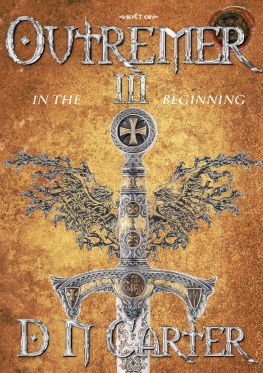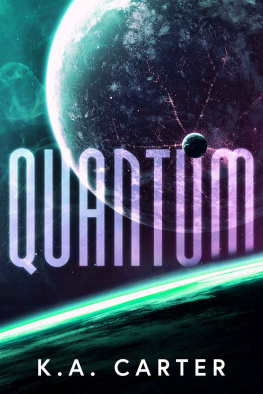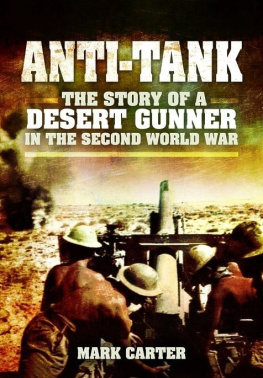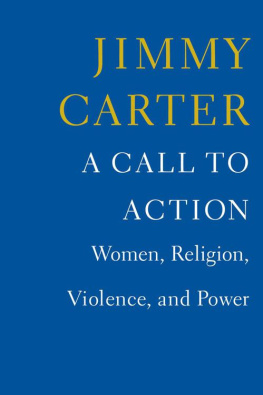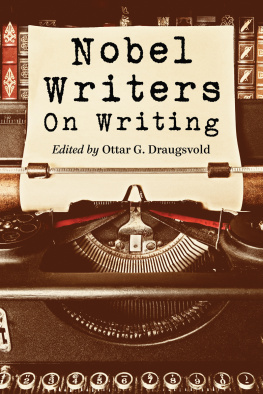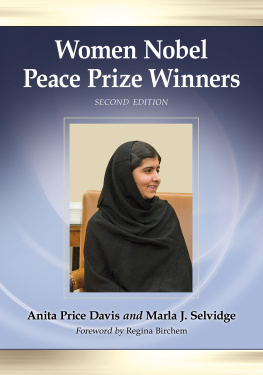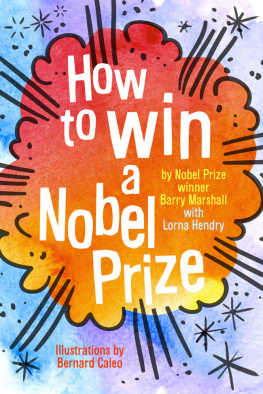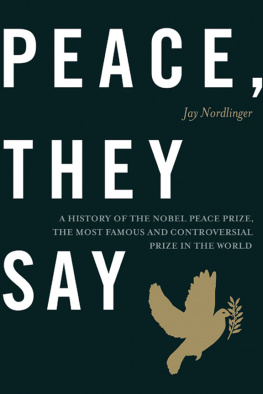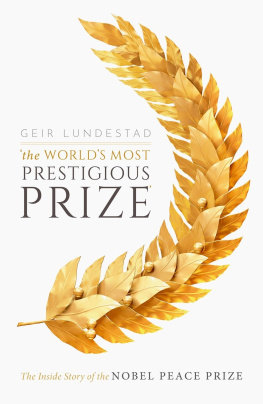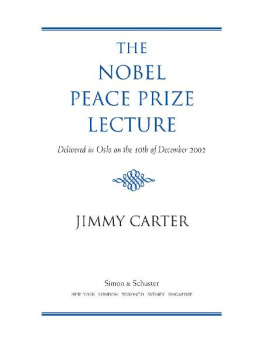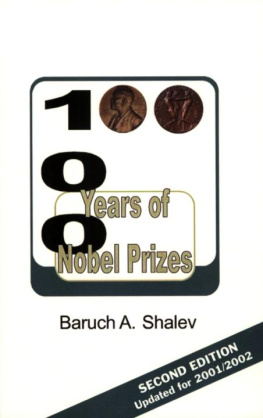Carter - The Nobel Peace Prize Lecture
Here you can read online Carter - The Nobel Peace Prize Lecture full text of the book (entire story) in english for free. Download pdf and epub, get meaning, cover and reviews about this ebook. City: Riverside, year: 2002, publisher: Simon & Schuster, genre: Politics. Description of the work, (preface) as well as reviews are available. Best literature library LitArk.com created for fans of good reading and offers a wide selection of genres:
Romance novel
Science fiction
Adventure
Detective
Science
History
Home and family
Prose
Art
Politics
Computer
Non-fiction
Religion
Business
Children
Humor
Choose a favorite category and find really read worthwhile books. Enjoy immersion in the world of imagination, feel the emotions of the characters or learn something new for yourself, make an fascinating discovery.
The Nobel Peace Prize Lecture: summary, description and annotation
We offer to read an annotation, description, summary or preface (depends on what the author of the book "The Nobel Peace Prize Lecture" wrote himself). If you haven't found the necessary information about the book — write in the comments, we will try to find it.
Carter: author's other books
Who wrote The Nobel Peace Prize Lecture? Find out the surname, the name of the author of the book and a list of all author's works by series.
The Nobel Peace Prize Lecture — read online for free the complete book (whole text) full work
Below is the text of the book, divided by pages. System saving the place of the last page read, allows you to conveniently read the book "The Nobel Peace Prize Lecture" online for free, without having to search again every time where you left off. Put a bookmark, and you can go to the page where you finished reading at any time.
Font size:
Interval:
Bookmark:
Thank you for downloading this Simon & Schuster eBook.
Join our mailing list and get updates on new releases, deals, bonus content and other great books from Simon & Schuster.
C LICK H ERE T O S IGN U P
or visit us online to sign up at
eBookNews.SimonandSchuster.com
We hope you enjoyed reading this Simon & Schuster eBook.
Join our mailing list and get updates on new releases, deals, bonus content and other great books from Simon & Schuster.
C LICK H ERE T O S IGN U P
or visit us online to sign up at
eBookNews.SimonandSchuster.com
Also by Jimmy Carter
Christmas in Plains
An Hour Before Daylight
The Virtues of Aging
Sources of Strength: Meditations on Scripture for a Living Faith
Living Faith
The Little Baby Snoogle-Fleejer
(illustrated by Amy Carter)
Always a Reckoning, and Other Poems
Talking Peace: A Vision for the Next Generation
Turning Point: A Candidate, a State, and a Nation Come of Age
An Outdoor Journal: Adventures and Reflections
Everything to Gain: Making the Most of the Rest of Your Life
(with Rosalynn Carter)
The Blood of Abraham: Insights into the Middle East
Negotiation: The Alternative to Hostility
Keeping Faith: Memoirs of a President
A Government As Good As Its People
Why Not the Best?

To my colleagues at The Carter Center

Following is the complete text of the Norwegian Nobel Committees announcement of the 2002 Nobel Peace Prize as distributed by the committee:
The Norwegian Nobel Committee has decided to award the Nobel Peace Prize for 2002 to Jimmy Carter, for his decades of untiring effort to find peaceful solutions to international conflicts, to advance democracy and human rights, and to promote economic and social development.
During his presidency (19771981), Carters mediation was a vital contribution to the Camp David Accords between Israel and Egypt, in itself a great enough achievement to qualify for the Nobel Peace Prize. At a time when the cold war between East and West was still predominant, he placed renewed emphasis on the place of human rights in international politics.
Through his Carter Center, which celebrates its 20th anniversary in 2002, Carter has since his presidency undertaken very extensive and persevering conflict resolution on several continents. He has shown outstanding commitment to human rights, and has served as an observer at countless elections all over the world. He has worked hard on many fronts to fight tropical diseases and to bring about growth and progress in developing countries. Carter has thus been active in several of the problem areas that have figured prominently in the over one hundred years of Peace Prize history.
In a situation currently marked by threats of the use of power, Carter has stood by the principles that conflicts must as far as possible be resolved through mediation and international co-operation based on international law, respect for human rights, and economic development.
Oslo, October 11, 2002
I am deeply grateful for this honor. I want to thank the Nobel Committee and the many people at The Carter Center who have worked side by side with me and my wife, Rosalynn, to promote peace, health, and human rights.
People everywhere share the same dream of a caring international community that prevents war and oppression. During the past two decades, as Rosalynn and I traveled around the world for the work of our Center, my concept of human rights has grown to include not only the right to live in peace, but also to adequate health care, shelter, food, and to economic opportunity.
I hope this award reflects a universal acceptance and even embrace of this broad-based concept of human rights.
This honor serves as an inspiration not only to us, but also to suffering people around the world, and I accept it on their behalf.
October 11, 2002

A t his death on December 10, 1896, Alfred Bernhard Nobel, the Swedish scientist who invented dynamite, endowed a fund from which the income was to be awarded annually to several recipients who conferred the greatest benefit on mankind.
At that time, Sweden and Norway were united, and Nobel decided to divide the responsibilities for awarding the prizes. Organizations in Sweden were to choose honorees in the fields of chemistry, physics, medicine, and literature, and a Norwegian committee would award the annual prize for peace. The first awards were made in 1901 on the anniversary of Nobels death, and in 1968 another Swedish Nobel prize was added in the field of economics.
Except for nineteen years when no selections were made, the Nobel prizes for peace have been given in Norway to ninety individuals. In addition, a number of awards have gone to the International Committee of the Red Cross, agencies of the United Nations, and to other organizations.
It has become obvious that the Nobel prizes are awarded for two basic purposes: to recognize past accomplishments of the laureates and to inspire future progress for peace and human rights.

I am deeply honored to receive the Nobel Prize for Peace. I first became aware of this award in 1952, when Albert Schweitzer was recognized for his dedicated work in a remote village in Africa. The award became dramatically important for all Americans when it was given in 1964 to Martin Luther King, Jr.
The first Nobel laureates whom I knew personally were Anwar Sadat and Menachem Begin, honored after we concluded a peace agreement at Camp David in 1978. I was very happy for my friends, who made courageous decisions leading to the signing of an Egyptian-Israeli peace treaty that has never been violated by either side.
In awarding me the prize this year, the Nobel committee mentioned my role in the Camp David Accords, but the primary achievements for which it was given are those of The Carter Center during the past twenty years. The monetary prize will enhance the Centers work, now in sixty-five of the poorest and most needy countries on earth, where we continue to wage peace, fight disease, and build hope among our suffering neighbors around the world.
J IMMY C ARTER

Y our Majesties, Members of the Norwegian Nobel Committee, Excellencies, Ladies and Gentlemen:
It is with a deep sense of gratitude that I accept this prize. I am grateful to my wife, Rosalynn, to my colleagues at The Carter Center, and to many others who continue to seek an end to violence and suffering throughout the world. The scope and character of our Centers activities are perhaps unique, but in many other ways they are typical of the work being done by many hundreds of non-governmental organizations that strive for human rights and peace.
Most Nobel laureates have carried out our work in safety, but there are others who have acted with great personal courage. None has provided more vivid reminders of the dangers of peacemaking than two of my friends, Anwar Sadat and Yitzhak Rabin, who gave their lives for the cause of peace in the Middle East.
Like these two heroes, my first chosen career was in the military, as a submarine officer. My shipmates and I realized that we had to be ready to fight if combat was forced upon us, and we were prepared to give our lives to defend our nation and its principles. At the same time, we always prayed fervently that our readiness would ensure that there would be no war.
Next pageFont size:
Interval:
Bookmark:
Similar books «The Nobel Peace Prize Lecture»
Look at similar books to The Nobel Peace Prize Lecture. We have selected literature similar in name and meaning in the hope of providing readers with more options to find new, interesting, not yet read works.
Discussion, reviews of the book The Nobel Peace Prize Lecture and just readers' own opinions. Leave your comments, write what you think about the work, its meaning or the main characters. Specify what exactly you liked and what you didn't like, and why you think so.

